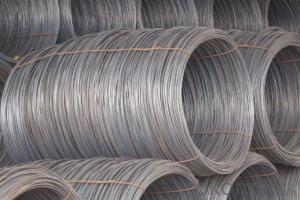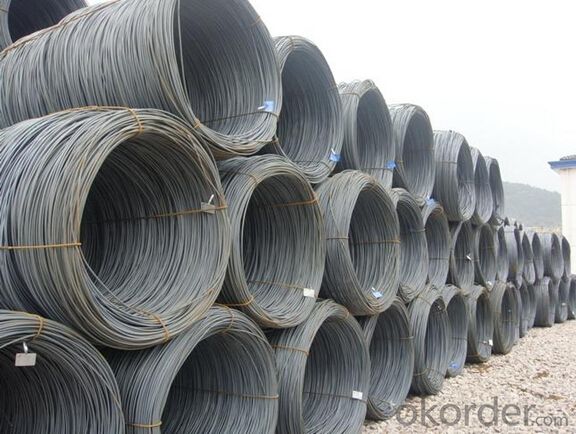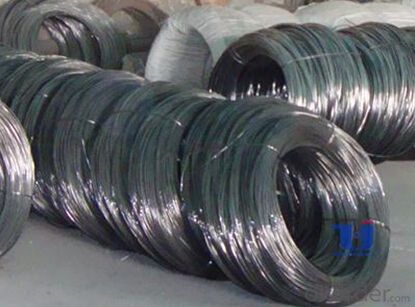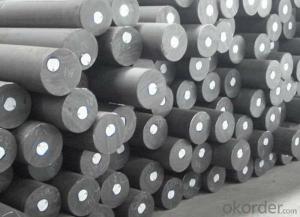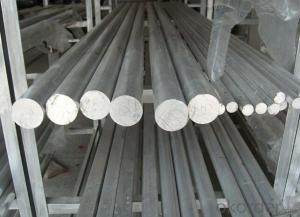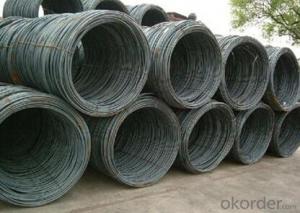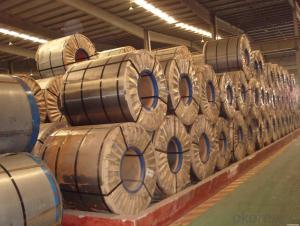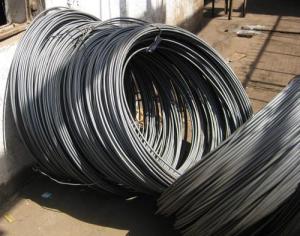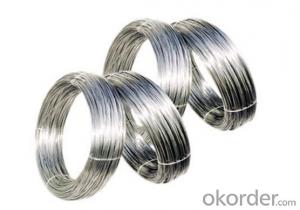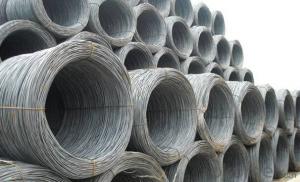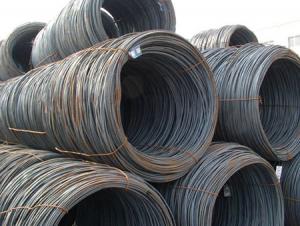Dia.8mm Grade SAE 1006 Coils Steel Wire Rod
- Loading Port:
- Tianjin
- Payment Terms:
- TT OR LC
- Min Order Qty:
- 10 m.t.
- Supply Capability:
- 10000 m.t./month
OKorder Service Pledge
OKorder Financial Service
You Might Also Like
Specification
Dia.8mm Grade SAE 1006 Coils Steel Wire Rod
Details of the Dia.8mm Grade SAE 1006 Coils Steel Wire Rod
| Steel Grade | Q195-Q235,Q235,SAE 1008-1018 Hot Rolled Steel Wire Rod |
| Diameter | 5.5, 6.5, 7,8, 9,10, 12,14mm.etc. |
| Coil weight | 2m.t. |
| Application | drawing, construction materials, machinery parts,construction for Houses, Bridges, Roads,Packing |
| Deliver Time | 25-30 days after receipt of L/C or deposit by T/T |
| Packing | In coils, loading in container or by bulk vessel |
| Payment terms | 1).100% irrevocable L/C at sight. |
| 2).30% T/T prepaid and the balance against the copy of B/L. | |
| 3).30% T/T prepaid and the balance against L/C |
| Chemical Composition(%) | ||||||
| C | Mn | Si | S | P | Cr | |
| SAE1006B | 0.03~O.07 | ≤0.32 | ≤0.30 | ≤0.045 | ≤0.040 | 0.3-0.35 |
| Mechanical properties | ||||||
| Yield strength(N/mm2) | Tensile strength(N/mm2) | Elongation(%) | ||||
| 250-280 | 350-380 | ≥32 | ||||
| Grade | Chemical Composition(%) | |||||
| C | Mn | Si | S | P | Cr | |
| SAE1008B | 0.10max | 0.3~O.50 | 0.15max | 0.050max | 0.040 max | 0.3-0.35 |
| Mechanical properties | ||||||
| Yield strength(N/mm2) | Tensile strength(N/mm2) | Elongation(%) | ||||
| ≥195 | 315-430 | ≥30 | ||||
Supplier of the Dia.8mm Grade SAE 1006 Coils Steel Wire Rod
CNBM International Corporation is the most import and export platform of CNBM group(China National Building Material Group Corporation) ,which is a state-owned enterprise, ranked in 270th of Fortune Global 500 in 2015.
With its advantages, CNBM International are mainly concentrate on Cement, Glass, Iron and Steel, Ceramics industries and devotes herself for supplying high quality series of refractories as well as technical consultancies and logistics solution.
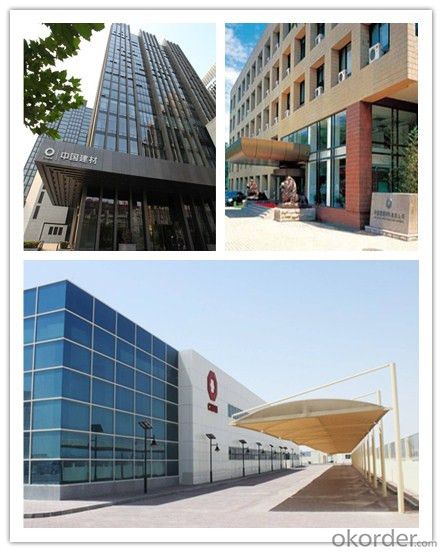
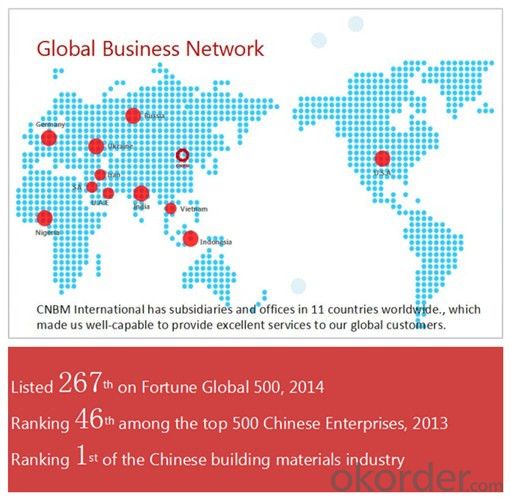
Delivery of the Dia.8mm Grade SAE 1006 Coils Steel Wire Rod
Packaging Detail | Sea worthy packing /as per customer's packing instruction |
Delivery Detail | 15 ~ 40 days after receiving the deposit |
Products Show
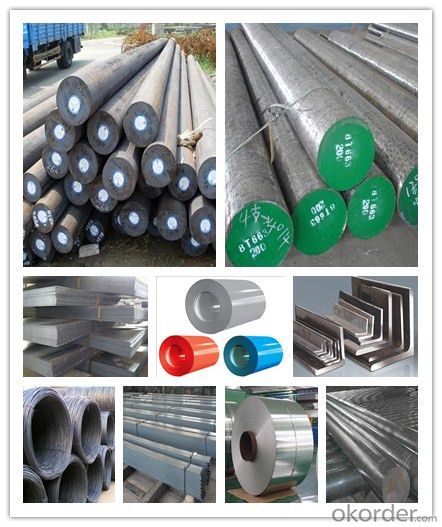
FAQ:
Are you a trading company or manufacturer? | Manufacturer |
What’s the MOQ? | 3 metric ton |
What’s your delivery time? | 15-35 days after downpayment received |
Do you Accept OEM service? | Yes |
what’s your delivery terms? | FOB/CFR/CIF |
What's the Payment Terms? | 30% as deposit,70% before shipment by T/T |
Western Union acceptable for small amount. | |
L/C acceptable for large amount. | |
Scrow ,Paybal,Alipay are also ok | |
Why choose us? | Chose happens because of quality, then price, We can give you both. Additionally, we can also offer professional products inquiry, products knowledge train (for agents), smooth goods delivery, excellent customer solution proposals. |
What's your available port of Shipment? | Main Port, China |
What’s your featured services? | Our service formula: good quality+ good price+ good service=customer's trust
|
Where are your Market? | Covering more than 160 countries in the world |
- Q: How is shock-resistant steel used in the production of impact tools?
- Shock-resistant steel is used in the production of impact tools because it has enhanced toughness and can withstand the high impact forces generated during use. This steel is specifically engineered to absorb and distribute the shock and vibrations produced when the tool strikes an object, reducing the risk of breakage and increasing the tool's overall lifespan.
- Q: How does special steel contribute to the wear resistance of products?
- The wear resistance of products is enhanced by special steel in various ways. Firstly, special steel possesses high strength and hardness, enabling it to withstand heavy loads and resist deformation. This characteristic is particularly vital in applications where products are exposed to abrasive forces or repetitive stress, such as in machinery parts or cutting tools. Furthermore, special steel often includes specific alloying elements that augment its wear resistance. For instance, the introduction of chromium can create a protective layer of chromium oxide on the steel's surface, acting as a barrier against corrosion and wear. Similarly, the incorporation of vanadium or molybdenum can heighten the steel's hardness and toughness, rendering it more resilient to wear and fatigue. Additionally, heat treatment can be employed to further enhance the wear resistance of special steel. Techniques like quenching and tempering can modify the steel's microstructure, resulting in a fine-grained and uniform composition. Consequently, this leads to improved hardness, increased resistance to wear, and enhanced dimensional stability. In conclusion, special steel contributes to the wear resistance of products due to its inherent strength and hardness, the presence of alloying elements that enhance wear resistance, and its capacity to undergo heat treatment for improved properties. These characteristics make special steel an exceptional choice for applications where durability and longevity are of utmost importance.
- Q: What are the different surface treatment methods for special steel?
- Some of the different surface treatment methods for special steel include heat treatment, plating, coating, and nitriding. Heat treatment involves heating and cooling the steel to improve its hardness, strength, and ductility. Plating involves applying a thin layer of metal, such as zinc or chrome, to enhance corrosion resistance. Coating methods like painting or powder coating provide a protective layer and can improve aesthetics. Nitriding involves introducing nitrogen to the steel's surface to increase hardness and wear resistance.
- Q: How does special steel contribute to the power generation aftermarket industry?
- Special steel plays a crucial role in the power generation aftermarket industry by providing high-quality and durable materials that are essential for the construction and maintenance of power generation equipment. Special steels, such as stainless steel and alloy steel, possess unique characteristics that make them well-suited for the demanding conditions and requirements of the power generation sector. One of the key contributions of special steel to the power generation aftermarket industry is its exceptional resistance to corrosion and oxidation. Power generation equipment, such as gas turbines and steam generators, operate in harsh environments where they are subjected to extreme temperatures, pressure, and exposure to various chemical elements. Special steel's corrosion resistance ensures that the equipment can withstand these challenging conditions, thereby minimizing the risk of failure and extending the lifespan of the equipment. Additionally, special steel offers excellent strength and toughness, allowing power generation equipment to withstand high mechanical stress and fatigue. The power generation industry relies on turbines, boilers, and other heavy machinery that are subjected to continuous operation and significant loads. Special steel's high strength and durability enable these components to endure the demanding conditions and effectively handle the power generation process, ensuring safe and reliable operation. Another significant contribution of special steel to the power generation aftermarket industry is its ability to maintain dimensional stability under extreme temperatures. Power generation equipment often operates at high temperatures, and special steel's thermal stability prevents distortion and deformation, ensuring that the equipment retains its shape and functionality over time. Moreover, special steel's versatility allows for the production of various components and parts, customized to meet the specific requirements of power generation equipment. Whether it is turbine blades, boiler tubes, or heat exchangers, special steel can be tailored to provide the desired mechanical properties, corrosion resistance, and thermal stability needed for each application. In summary, special steel is an indispensable material in the power generation aftermarket industry. Its corrosion resistance, strength, toughness, thermal stability, and versatility make it an ideal choice for constructing and maintaining power generation equipment. By providing reliable and durable materials, special steel contributes to the efficiency, safety, and longevity of power generation systems, ensuring the continuous supply of electricity to meet the growing demands of our modern world.
- Q: What are the main environmental impacts of special steel production?
- The main environmental impacts of special steel production include high energy consumption, significant greenhouse gas emissions, and the generation of large amounts of air and water pollution. The production process requires immense amounts of energy, primarily from fossil fuels, leading to the release of carbon dioxide and other greenhouse gases, contributing to climate change. Additionally, the production of special steel involves the use of various chemicals and the generation of hazardous waste, which can contaminate air and water sources, harming ecosystems and human health. Efforts are being made to mitigate these impacts through improved technologies and practices, such as energy efficiency measures and waste management systems, to minimize the environmental footprint of special steel production.
- Q: What is the role of special steel in the automotive industry?
- Special steel plays a crucial role in the automotive industry by providing strength, durability, and resistance to wear and corrosion for various components. It is used in the production of engine parts, chassis components, transmission systems, and safety features, ensuring enhanced performance, reliability, and safety in vehicles.
- Q: How is precipitation-hardening steel used in the aerospace industry?
- Precipitation-hardening steel is extensively used in the aerospace industry due to its exceptional strength-to-weight ratio and high corrosion resistance. It is employed in critical components such as aircraft structures, landing gears, turbine blades, and fasteners. The steel's unique property of being able to strengthen through a precipitation process allows for the manufacturing of lightweight and durable parts, resulting in improved fuel efficiency, enhanced performance, and increased safety in aircraft operations.
- Q: Can special steel be used in the production of turbine blades?
- Yes, special steel can be used in the production of turbine blades. Special steel is known for its exceptional strength, durability, and resistance to high temperatures and corrosive environments, making it an ideal material for turbine blades which are subjected to extreme conditions in power generation systems.
- Q: How is special steel classified?
- Special steel is classified based on its chemical composition, physical properties, and intended use. It can be categorized into various types such as stainless steel, tool steel, alloy steel, and high-speed steel, each designed to meet specific requirements and applications in industries like automotive, aerospace, construction, and manufacturing.
- Q: What are the different methods of strengthening special steel?
- There are several methods of strengthening special steel, each with its own advantages and applications. One common method is through heat treatment, which involves heating the steel to a specific temperature and then cooling it rapidly or slowly, depending on the desired outcome. This can include processes like quenching, tempering, and annealing, which modify the microstructure of the steel to enhance its mechanical properties. Another method is alloying, where different elements are added to the steel to improve its strength. For example, adding elements like chromium, nickel, or molybdenum can increase the steel's resistance to corrosion, while elements like vanadium or tungsten can enhance its hardness and wear resistance. Cold working is another technique used to strengthen special steel, which involves deforming the steel at room temperature through processes like rolling, forging, or drawing. This helps to align the steel's crystalline structure, increasing its strength and hardness. Additionally, surface treatments can be applied to special steel to improve its strength. These can include techniques like carburizing, nitriding, or plating, which introduce a hardened layer or coating on the surface of the steel to enhance its wear resistance and durability. Each of these methods has its own advantages and can be tailored to suit specific applications and requirements. By combining various strengthening techniques, special steel can be customized to meet a wide range of industrial needs, making it a versatile and reliable material.
Send your message to us
Dia.8mm Grade SAE 1006 Coils Steel Wire Rod
- Loading Port:
- Tianjin
- Payment Terms:
- TT OR LC
- Min Order Qty:
- 10 m.t.
- Supply Capability:
- 10000 m.t./month
OKorder Service Pledge
OKorder Financial Service
Similar products
Hot products
Hot Searches
Related keywords
